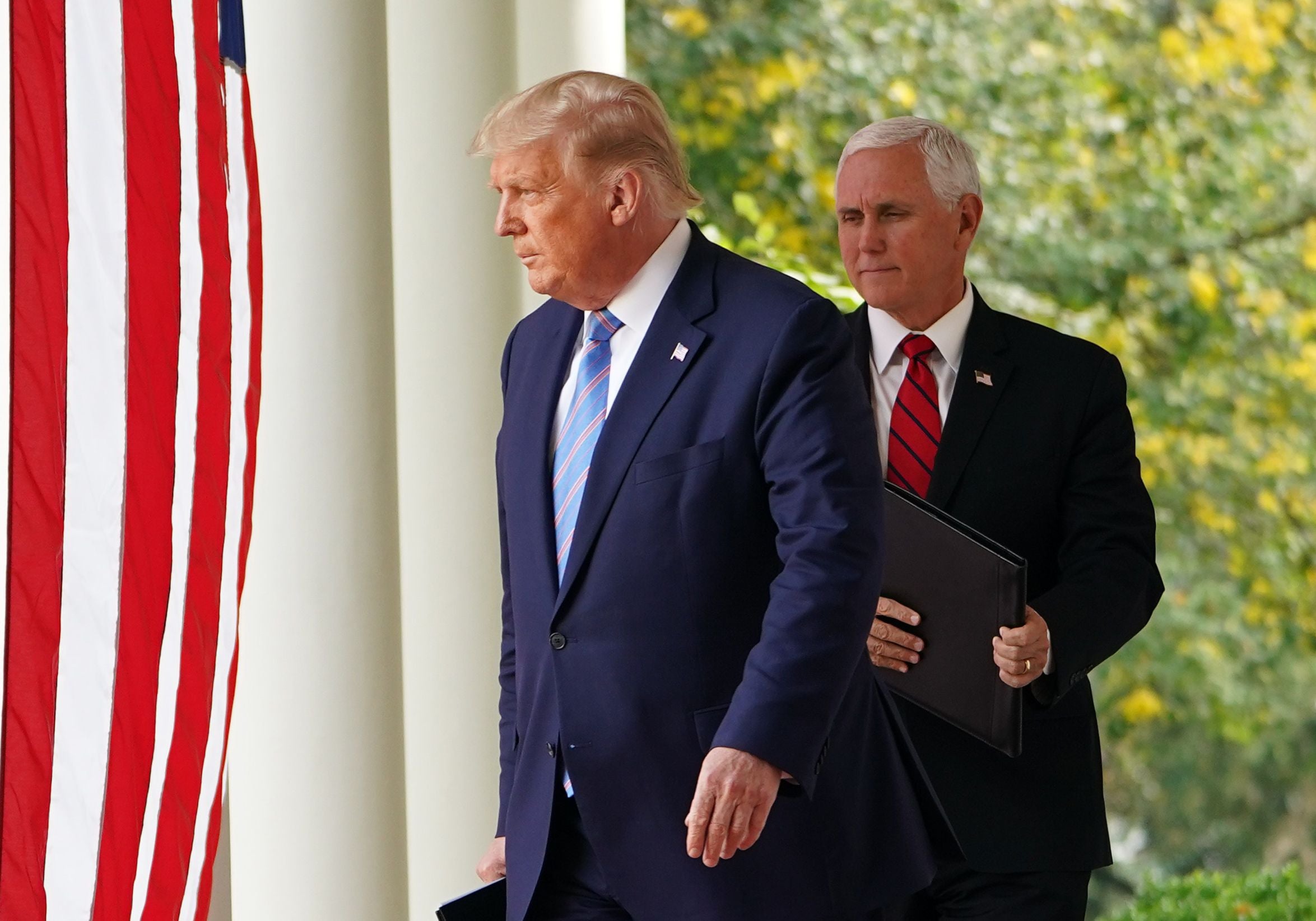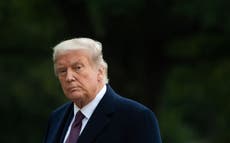Emerging from Trump’s shadow: How president’s Covid-19 diagnosis shines spotlight on Mike Pence
Pence will take over if Trump is incapacitated. But as head of the US coronavirus taskforce, his record does not serve him well, writes Kim Sengupta


The announcement that Donald Trump has tested positive for coronavirus brings into scrutiny a man who has been mainly in the shadows in this extraordinary and turbulent administration – Vice President Mike Pence.
There is a need for voters to examine someone who may find himself with the levers of power. Pence, who tested negative in the wake of Trump’s diagnosis, can take over under the 25th amendment if the president becomes incapacitated. And, if Trump recovers and wins the election, one needs to bear in mind the uncertain long-term effects of Covid-19 on an overweight 74-year-old man with health issues.
While Democrat opponents have joined international leaders in sending messages of sympathy to Trump and Melania, who has also tested positive, there are renewed attacks on the country’s response to the pandemic, which has often been shambolic.
Pence is vulnerable to criticism in this. Trump had appointed him as the head of the US’s coronavirus taskforce at the end of February. There was not a single reported fatality from the disease in the country at the time: the death toll now stands at more than 200,000 – the highest in the world.
Trump supporters have made much of Joe Biden’s supposed physical frailties with cries of “vote Biden, get Harris” – a warning about Kamala Harris’s supposedly radical, left-wing agenda. But there is now likely to be a more thorough look at Pence who has been very much in the sidelines with a president relentlessly hogging the limelight.
Voters will soon get a chance to examine the two running mates with the first vice-presidential debate at Salt Lake City next Wednesday. This is before the next head-to-head between Trump and Biden was due to take place on 15th October in Florida, one that may now be in doubt.
Vice-presidential debates are normally a sideshow in US presidential elections, albeit there have been some memorable vignettes in some of them. One of the most well-known is Lloyd Bentsen’s put-down of Dan Quayle, George Bush Sr’s running mate. After Quayle compared himself to John F Kennedy, Bentsen delivered this withering riposte: “I served with Jack Kennedy. I knew Jack Kennedy. Jack Kennedy was a friend of mine. Senator, you’re no Jack Kennedy.”
Joe Biden was expected to easily see off Sarah Palin, who had already made a number of gaffes as John McCain’s running mate, in 2008. But although polls afterwards showed that Biden was viewed to have won, Palin gave a surprisingly polished and gaffe-free performance.
Trump had mocked Biden in the last presidential debate over coronavirus for wearing the “biggest mask I’ve ever seen” and refusing to hold large gatherings. The president had boasted of his own rallies, declaring “we’ve had no negative effect”.
Trump, the largest driver of coronavirus misinformation in the media about the pandemic according to a Cornell University study, is not alone in the administration in being dismissive about precautions against coronavirus: masks being one case in point. Three days after being appointed to head the Covid response, Pence was categoric: “Let me be very clear, the average American does not need to go and buy a mask.”
It should be noted that he was backed at the time by senior health officials like Anthony Fauci, who also cautioned against a rush to buy masks around that time, one reason being that it would eat into scarce supplies for doctors and nurses.
But Pence continued with his stance long after others had changed their mind. In April he made a highly publicised visit to the Mayo Clinic in Minnesota where he was the only person not wearing a mask. After an angry response from staff and patients, the vice president acknowledged that he had made a mistake, and should have worn a face covering.
Other pronouncements by Pence on coronavirus have also been contentious. On 16 June, he wrote in a Wall Street Journal op-ed that that “there isn’t a coronavirus second wave” and assured that America was “winning the war against the invisible enemy” with new cases falling from about 30,000 per day in April to 20,000 a day. A week later the numbers per day had risen to 40,000.
But the vice president has also won praise for listening to a wide array of opinions over tackling the pandemic and for trying hard to ameliorate the acrimony between the White House and states on the pandemic.
There are other areas of Pence’s public life which had led to criticism, especially on social policy.
As the governor of Indiana he signed what was some of the most restrictive regulations on abortion at the time. He was also one of the leaders of the national campaign to defund Planned Parenthood.
Pence had also helped to pass “religious freedom” laws which would allow businesses to refuse service to LGBT people if they cited religious objections. He signed an amendment intended to protect sexual orientation after companies warned they would stop projects in Indiana if the original law was allowed to stand.
As a congressman, Pence opposed federal funding for treatment of HIV and Aids sufferers unless the government simultaneously invested in programmes discouraging people from engaging in same-sex relationships.
However much, or less, people know about Pence, he does not appear to do too badly against Kamala Harris in polls. A recent survey on behalf of The Economist/YouGov, found that 40 per cent of Americans have a favourable opinion of Pence, compared with 37 per cent of Harris. Around 25 per cent are uncertain of their opinion about Harris, while only 14 per cent are uncertain of their opinion of Pence – the poll did not say whether that opinion was positive or negative.





Join our commenting forum
Join thought-provoking conversations, follow other Independent readers and see their replies
Comments